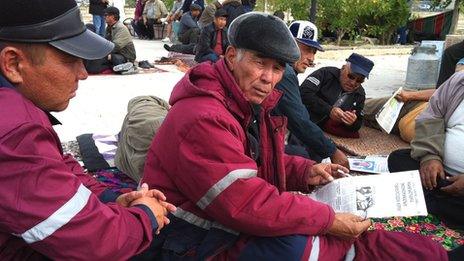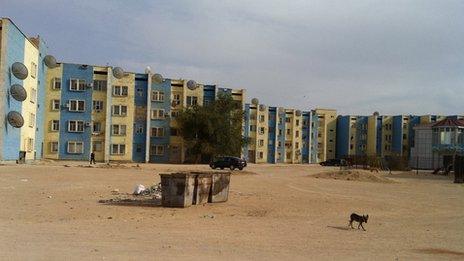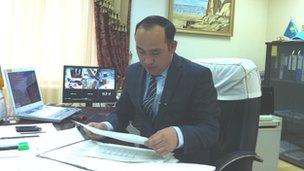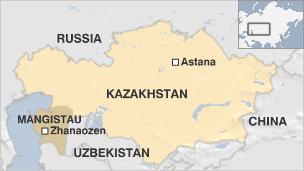Deadlock in Kazakhstan as oil workers strike
- Published

Strikers have been camped out in the town square for several months
For five months, hundreds of workers from the oil fields of western Kazakhstan have been on strike demanding better pay and working conditions. Now the country's longest-running industrial dispute, it has led to the loss of hundreds of millions of dollars in oil revenue, reports the BBC's Rayhan Demytrie.
"Do you believe in mysticism?" asked Kiikbay Eshmanov, the director of Ozenmunaigas, an oil field owned by Kazakhstan's state oil company Kazmunaigas.
From his office overlooking the main square in Zhanaozen - a small town in the desert of western Kazakhstan - groups of his former employees could be seen standing around in their red company jackets.
"I seriously think those people in the square have been hypnotised," he said. "In the past few years we've raised their salaries six times.
"Their wages are already way above the national average. Because of this strike the company has lost production of more than one million tonnes of oil."
Strikes since 2008 have generated pay rises - average salaries at Ozenmunaigas are between $1,000 (£625) and $1,500 a month.
But the strike organisers claim that danger money for the tough conditions they work in is still owed to them.

Miners say the cost of living in the remote desert town is very high
Local courts declared their latest strike illegal in May. Ozenmunaigas fired 1,000 of its staff after calls for them to get back to work failed. In early July police in riot gear were used to disperse a demonstration at the oil field.
Since then, the strikers have decamped to the main square in Zhanaozen, sitting shoulder-to-shoulder around the clock on carpets and blankets spread over the cold flagstones.
"There was a government decree to pay extra for working in dangerous conditions, but we are not being paid that money," said one of the protesters, Kaliyev Tangotar.
"There is no justice, the authorities only support the employer and our human rights are not respected."
The strikers say that even with above-average salaries the money is still not enough to get by. Zhanaozen is isolated and so everything must be brought in, making the cost of living high.
'No winners'
The Zhanaozen strike is one of several industrial actions to have hit western Kazakhstan's Mangistau region this year.
Workers at Karazhanbasmunai, an oil field jointly owned by Kazmunaigas and a Chinese state corporation, took to the streets in the nearby Caspian port town of Aktao in May. Their protest was also broken up by police.
Karazhanbasmunai fired 993 of its workers. They too hold daily vigils outside the company headquarters in Akatu to demand their jobs back.
The protest also spread to Ersai-Caspian Contractor, an Italian and Kazakh joint-venture operating in the region.

Mr Eshmanov says the workers are paid better than most of their compatriots
The industrial unrest has hurt Kazmunaigas. It claims production is down by 7% from this time last year - largely because of the strikes. That has cost almost $600m in lost revenue.
"There are no winners," said Daulet Zhumadil, press secretary for Kazmunaigas Exploration Production (KEP), a London Stock Exchange-listed subsidiary of the national oil company Kazmunaigas.
"All sides involved are losing. The state as the main shareholder is losing its revenue in two ways - as tax revenue receiver and as the main shareholder it will get less profit. About 60% of shares in KEP belong to the state through the national company Kazmunaigas.
"I would like to reiterate that it is not labour dispute, it is an illegal action, because it's been recognised as such by courts."
'Harassment'
In an attempt to stifle protests, the authorities sought the prosecution of strike movement leaders.
Natalia Sokolova, a union lawyer who advised workers on their rights, has been jailed for six years for "inciting social discord".
Another union representative, Akzhanat Aminov, has been given a two-year suspended sentence for organising illegal gatherings.

Dozens of workers have been fined and sentenced on administrative charges for participating in strikes. There have been numerous claims of intimidation and harassment.
But it was the killing of a trade union activist, Zhaksylik Turbayev, at his workplace that caused most anger among the workers. Police are investigating but have no suspects.
In the wake of his death, hundreds of workers left the pro-presidential party Nur-Otan and joined the newly-formed opposition Popular Front movement, which was more sympathetic to their cause.
Opposition politicians have also sought to make political capital. The leader of the opposition Azat party, Bulat Abilov, visited the Mangistau region in June.
A Youtube video shows him addressing the striking oil workers at Ersai.
"They are not coming for an open dialogue with you. They are not paying attention to your demands. They say there is no money. We say there is money," he told the crowd.
"Last year alone the price of oil rose by 50%. Did your salaries rise by 50%?"
"No!" replied the crowd.
Political analyst Dosym Satpayev said the strikes showed government social policies were not working.
"Kazakhstan is a rich country with small population, but in those regions where there is plenty of oil and gas people continue to live in poverty. Now many people are beginning to ask why."
He warned that they could have a knock-on effect.
"When the opposition tried to use it for its own political goals, I think some political structures became afraid that this social protest might spread to other regions of Kazakhstan," he said.
'Want to be heard'
While the company claims its former employees are no longer their responsibility, the workers on Zhanaozen square have no plans to back off.
A minivan with a surveillance camera keeps watch and the protesters eye it warily. Protesters say they can muster large numbers of supporters - their families - if the police try to move them.
Five months into this dispute, the mood in the square is one of anger. It is no longer just complaints about fair pay - they are condemning the crumbling infrastructure and lack of development in a town that has helped to make the country rich.
"We want to develop civil society," said one protesting oil worker, Isa. "We want our voices to be heard, not just the bosses dictating what to do.
"We are so tired of this. For the 50 years since this city came into existence nothing good happened here. But this square is now turning into free Kazakhstan - we can say here everything that we want."
- Published4 July 2011
- Published8 April 2011